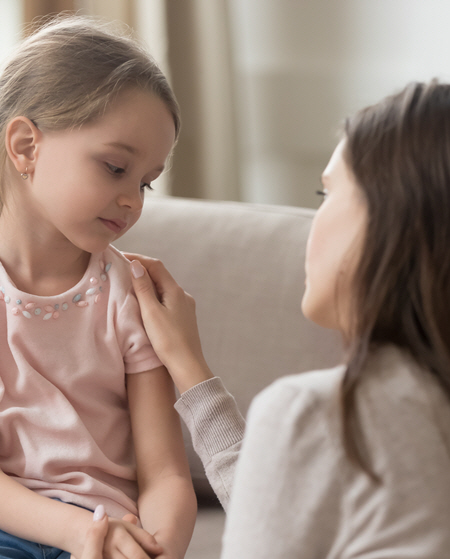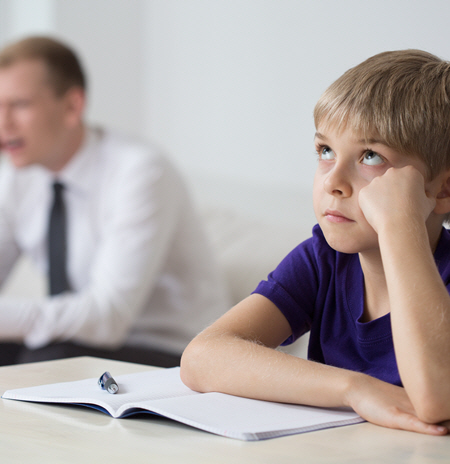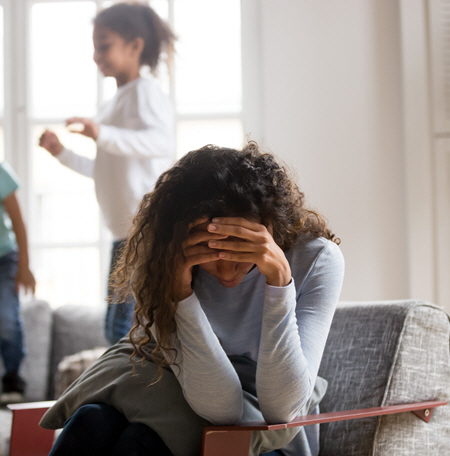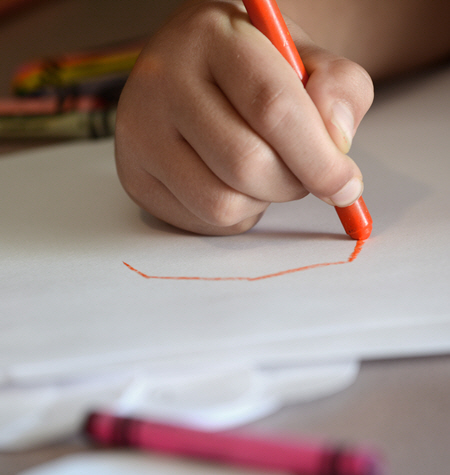 This is not how you imagined parenthood.
This is not how you imagined parenthood.
Are teachers calling you almost daily with concerns about behavior and academic performance?
Have you noticed that your child can’t make or keep friends?
Does it bother you that others don’t seem to understand your child’s uniqueness and expect too much?
Heartbreaking as it is to admit, you can see that your child is not happy.
As a parent, your child’s well-being and happiness are of the utmost importance to you.
You want better for your child – better than what you had growing up.
How could this have happened?
Just a few of the things children tell me they HATE about their parents…
“Act worse than strangers and outright ignore each other, but if I did that, I would be in trouble.”
“Say sarcastic things about other parent or mood/countenance changes (answers harshly or rolls eyes, etc.) when I mention another parent.”
“Tease me when they’re nervous thinking it is ‘fun.’”
“Talk about me right in front of me as if I am not there…”
“Never turns their cell phone off or leave it at home, so we can be alone together.”
“Tell what I have told them in private even when I asked them not to tell anyone.”
“Buy me things and let me do what I want but won’t spend time playing with me.”
“Ask me questions to get information (on other parent), and I know what they are trying to do.”
 If someone speaks to our child and there is no response…
If someone speaks to our child and there is no response…
… we are quick to remind them to “answer” or “say hi,” etc. We don’t want our children acting rude even if they don’t really like the person who spoke to them.
Yet many kiddos tell me their parents will not even speak or look at each other during the possession exchange. This is very painful and makes the child feel rejected and like, “I’m the problem because clearly mom and dad would not have to go through this if I weren’t here.”
Kids feel safe and happy when their parents can be cordial, respectful, and exchange common courtesies. The anxiety and fear creep in that their parents will never stop the fighting even though divorced. Kids feel like it is their fault; because if they did not exist, there would be no need for mom and dad to have to see each other.
There’s often a vicious cycle at play…
Perhaps you’re feeling the weight of not living up to your expectations as a parent. Yet, the more you try, the more confused and entangled you feel. The “fixes” you try never seem to “stick.”
You are determined to “make your child happy.”
But the irony is that your child likely picks up on your worries and anxieties for them… which, in turn, increases your child’s emotional and behavioral struggles.
 You could use a partner. That’s why I’m here.
You could use a partner. That’s why I’m here.
I am your partner in understanding what is happening to and within your child.
You, as the parent, are very much a significant part of this process.
You are the expert on your child(ren), and I depend on you to help me help them. We will work together to ensure your child(ren) ‘s needs are not missed or ignored! I will provide and seek feedback from you from time to time. Always feel free to reach out to offer or ask for feedback on your end, too. You also matter!
No one loves your child(ren) more than you do. As the most important person in their world, your concerns and needs mustn’t get lost in the process of litigation with all the focus on the child(ren). Your child(ren) is your priority, and they are mine; however, you are their world, and they need you to be strong, healthy, and happy to ensure you can take the very best care of them!
You have a role as their parent. My role is different.
It’s a strong therapeutic advantage that I’m not their parent.
Children want to talk to someone they don’t have to impress. They love you and want to please you, so that makes it hard to talk about things they don’t think you will like or approve of. They tend to stuff it if it upsets you.
I can let them vent or talk about something that they can get off their chest without feeling shame or guilt over. We often laugh most about the things the child(ren) regret thinking, feeling, or doing. Once they realize just because they thought a bad thought, it doesn’t make THEM a bad person – and just because they made a wrong decision, it doesn’t make THEM a failure – they are well on their way to accepting not only their shortcomings, but also yours… without blame or shame.
When children are treated with compassion and understanding, they can handle disappointments in life. Thus, they become capable of understanding that all parents make mistakes and deserve another chance to take responsibility, make amends, and learn from their decisions to make wiser choices moving forward.
As a third or neutral party, I can impart hope to your child while teaching him/her new skills to work out problems. Your child’s ability to share how s/he feels and express their thoughts about what you or I can do to make things better improves their likelihood of choosing healthy relationships in their future. Much of their fear and anxiety are relieved when they know they have a safe person and place to explore new ways to connect in relationship with their parent(s).
My role is to observe your child at his or her emotional and developmental level.
I then help your child “see” their emotions more clearly – and in a different way.
For example, if Nicole* doesn’t ever talk about her feelings to either parent, I will begin to give her gentle home exercises to speak up and say what she feels… such as I feel hungry for pizza, or I feel too alert to go to bed yet.
Children are hesitant to express themselves because they are fearful of upsetting or angering their parent(s). These are humorous and safe ways to talk about “feelings” without painful consequences. Next, we gradually work on their ability to say, “I feel sad that you won’t play with me… or angry that you yelled at me… or lonely that you don’t listen to me.” We focus on reducing anxiety and discovering new ideas and learning new ways to channel your child’s feelings and energy. Your child will also learn to recognize their inner thoughts and begin practicing ways to replace the negative ones with more positive, helpful ones.
For pre- and elementary-school-aged children, play therapy is vitally essential… and effective in alleviating symptoms of depression and anxiety. In a very safe therapeutic environment, your child will learn how to explore and express their feelings.
 It was well said that play is the work of children.
It was well said that play is the work of children.
Our little ones do not have the language development or skill that adults have; yet, our children “feel strong emotions.” The ability to feel without the ability to express can create frustration and emotional pain in many other ways. Once a child learns to say what they think, they don’t always feel there is a safe person to talk to about it.
The way a child learns to make sense of their world is through the practice of play. Children express innermost emotions and deep feelings, as they interact with toys in their “pretend” world. As a therapist, I join the child’s world on their level to engage, accept, and understand the feelings they express as they play.
Over time, child(ren) reveal more and are less guarded. They “experience” the therapy session as a safe place to express themselves without a need to please me. They are not pressured to talk; they can share or not share in their timing.
It is very natural for children to convey emotions as they play, and I pick up on these to work with your child(ren) to help them express the emotion, improving their ability to problem-solve and communicate with others.
Some of the Play Therapy we do:
- Interpret play for emotional content
- Non-Directive (or free play) Therapy
- Directive Therapy
- Interpret drawings for emotional content
- Depending on the child and the situation, I may guide the child toward certain methods of play or let them choose for themselves
- Bibliotherapy (reading books that solve a problem that is similar to the child’s)
- Board and card games focused on development of social, emotional, communication and compassion skills
There are any number of other ways we can use play therapy to get to know your child and help them cope with life’s challenges and problems.
For example, the child might begin to play with a dollhouse and some dolls, and they are asked to act out some problems they have at home. Or if the child is playing with hand puppets, they may be asked to recreate something they found stressful or frightening. I may engage with the child in a “once upon a time” story to see what the child might bring to light. Or maybe read stories that solve a problem similar to your child’s.
Only talking and asking questions while your child is drawing or painting can provide opportunities to gain insights into their thought process. I often play various games with the child to encourage problem-solving, cooperation, and social skills.
Here are some of the critical questions that will guide us…
How can therapy help your child and you look at what is happening as a family while also maintaining your individuality as separate people?
How can you be together and yet also fully see one another?
Is it possible to grow together as parent and child?
Are you able to see parts of yourself in your child but nurture the development of their uniqueness?
 Let’s talk about how we can help your child…
Let’s talk about how we can help your child…
… and get you to that place where the anxieties, guilt, and fears are no longer driving your everyday thoughts. I want to help you reclaim your energy and refocus on allowing your child’s emotional growth to occur as it needs to so that you will finally feel confident in your parenting skills.
We work through the process of anxiety, helping you and your child access that “playing” space where you both can explore and try out new ideas that lead you back to feeling ok – perhaps even back to the image you once cherished of what parenthood was supposed to be like.
It’s a process of growth, unity, and change… but you and your child can do it!
Call me today for a free 15-minute consultation: (281) 900-8040.
*Names and demographics changed to preserve client confidentiality.

